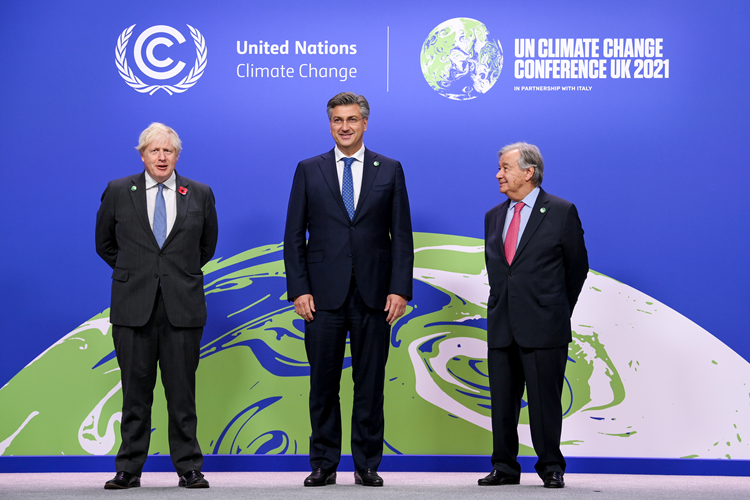- Published: 02.11.2021.
Croatia will reduce CO2 emissions by 45% by 2030, our coal phase-out year is 2033
Address of Mr Andrej Plenković Prime minister of Croatia at 26th UN Climate Change Conference of the Parties in Glasgow.
Your Excellencies,Climate change is the greatest challenge of our lifetime and this century.
Even with the most decisive action now, it will still irrevocably worsen lives of generations to come.
Resolute and urgent action now can – however – significantly reduce this decline.
As leaders, not only as concerned individuals, it is upon us to enact and implement policy choices to do so.
At a minimum, we must achieve the goals of the climate agreements we have already concluded and act more vigorously in their fulfilment.
This is key to narrow the ever-increasing gap in areas where we are already off-track.
We must also be more ambitious.
This is a necessity. Achievable only if we act together.
Joint action is possible only with the engagement of businesses and industries, valuable contribution of the civil society and the overall support of our citizens.
Their proper understanding of effects of climate change, through raising awareness and education, is crucial for winning this battle.
Ladies and gentlemen,
Croatia takes nature protection seriously:
We have the 4th lowest carbon footprint per capita in the EU.
Croatia’s forestry has centuries-long tradition of sustainable management.
With 93% of certified forests, our CO2 absorption rate per capita is twice the EU average.
Our Plitvice Lakes National Park are in the top five UNESCO World Heritage sites ranked by the size of the net carbon sink.
Altogether, 38% of our land is under protection.
With 2 strict reserves, 8 national parks and 12 nature parks, we are a country blessed with immense biodiversity.
To show our continued dedication, I wish to lay out a few of our commitments:Croatia will participate with, for us highly aspiring, 45% in the EU’s ambitious goal of a 55% reduction in CO2 emissions by 2030. Our coal phase-out year is 2033, but we will push to do it even earlier.
- With its 2030-target for renewables amounting to just above 39% in final consumption, Croatia surpasses Europe’s goal of 32%.
- We aim to have more than 65% of renewables and 100% low-carbon in final production.
- Croatia sees clean mobility and innovative technologies as an opportunity, all the more so that one of the world leading companies for the development of e‑mobility and self-driving vehicles, Rimac automobili, comes from Croatia.
- As a country of a thousand islands, Croatia intends to contribute to the global goal of ocean protection by having 30% of sea within national jurisdiction under protection.
- As a highly popular tourist destination, Croatia intends to compensate the impact of tourists on CO2 emissions by planting more than 1 million additional trees annually by 2030.
- We are enhancing resilience and increasing our aerial firefighting capabilities by establishing a regional centre in Zadar, Dalmatia. Its active capabilities will be to the benefit of the Mediterranean climatological hot spot in the vein of what we provided this summer to fight fires in Bosnia and Herzegovina, Greece and Turkey.
Ladies and gentlemen,
we must all bear our share of responsibility.
Fighting climate change requires challenging adaptation and enormous efforts by economies and societies worldwide.
The cost of not doing so will be immeasurably greater.
We can act willingly or end up being forced to act. Any delay will make the process infinitely more painful.
Let us work together to achieve these goals within the UN framework.
Thank you.
